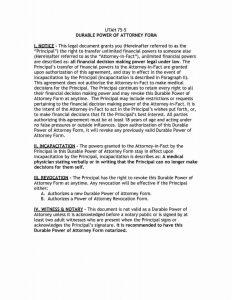Free Fillable Utah Power of Attorney Form
Utah’s power of attorney laws and guidelines provide specific details on how to fill out all such legal forms. The document will need to take on the form of that represented in the state’s statute until needed. This document stays in possession of the principal and the attorney-in-fact until it gets void. Forms should be filled out following the guidelines outlined in Utah Code Sections 75-9-101, which specify that:
- The faith of the principal’s health may or may not lie in the hands of the attorney-in-fact. Still, no matter the case, a power of attorney cannot provide the attorney-in-fact with the right to decide to continue or terminate life-support in life-or-death situations.
- When filling out Utah power of attorney forms, principals should create the form following the statute’s format.
- If desired, a power of attorney must be used to place the attorney-in-fact in charge of medical decisions
- The principal has the legal right, at any moment, to terminate a power of attorney.
Why Use a POA Form in Utah
Power of attorney forms serve many different purposes depending on the desires of the principal. In some circumstances, individuals look to pass on the right to act on their behalf for financial, medical, or real estate purchasing purposes. In other cases, a power of attorney serves as a document to help children care for their elderly parents or spouses care for their significant other in the case of an accident that leaves them disabled. The timing of creating a POA is crucial, as it must take place before a disability happens, with the principal in good mental and physical health.
Other Utah Forms By Type
Other Power of Attorney Forms By State
- Alabama power of attorney
- AZ power of attorney form
- California power of attorney form
- Colorado power of attorney
- CT POA
- Florida power of attorney form
- Georgia POA
- Idaho power of attorney
- Illinois POA
- Indiana power of attorney form
- Kansas power of attorney
- Kentucky POA form
- Louisiana power of attorney
- Maryland POA
- Ma power of attorney
- Michigan power of attorney form
- MN POA
- MO power of attorney form
- Nevada power of attorney
- NJ POA form
- NM POAform
- NY power of attorney form
- NC power of attorney
- Ohio power of attorney form
- Oklahoma POA
- Oregon power of attorney pdf
- PA POA
- SC power of attorney
- Tennessee power of attorney
- Texas power of attorney form
- Virginia power of attorney
- WA POA
- Wisconsin POA form
